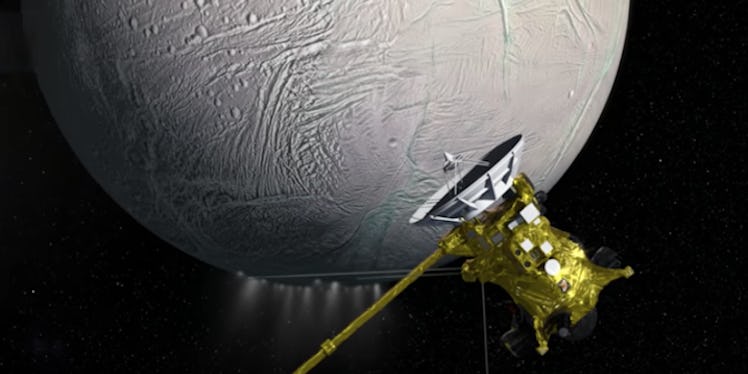
NASA Says Saturn's Moon Could Support Life, So You Have Options Besides Canada
If the state of the world has you stressed, don't fret (OK, still fret a little).
Published today in Science, a journal, NASA has uncovered evidence that suggests life could be supported elsewhere in our own solar system.
One of Saturn's 62 moons, Enceladus, has been releasing hydrogen molecules into the atmosphere, which was picked up by NASA's Cassini spacecraft.
These hydrogen molecules, potentially from the icy ocean under the moon's crust, are a pretty big deal because they hint there are some underwater hot-spots in the sub-surface ocean.
If that's the case, then the areas around the hotspots would be the perfect breeding area for small organisms like bacteria to thrive.
But don't pack your bags just yet.
Though it's exciting to postulate would could be done in the future, finding a semblance of life doesn't mean you've found your next vacation destination.
On Earth, these hot-spots are referred to as hydrothermal vents, and are located in one of the most unforgiving landscapes on the planet: the deep ocean.
Many scientists do believe these conditions are what helped breed life on Earth – so maybe in roughly 4.5 billion years, Enceladus will be ready to be inhabited.
Anyway, NASA has speculated for some time that hydrothermal activity is taking place on Enceladus, but finding the hydrogen molecules seems to have confirmed its hypothesis.
This also means Enceladus has four of the six elements needed to sustain life on Earth: carbon, nitrogen, oxygen, hydrogen – all that's missing is phosphorus and sulfur.
So, what's the next step for NASA? Confirm its hypothesis.
Hydrogen isn't enough evidence there's life – only life is. So the scientists now have to come up with a spacecraft that can go back to specifically search for signs of life.
One of NASA's scientists Scott Edgington said in an interview with The Verge the goal was to, "Design a lander that could land in one of those tiger stripes at the south pole and sample that ice as it's coming out of those cracks."
Citations: NASA finds more evidence that the ocean on Enceladus could support alien life (The Verge), Detecting molecular hydrogen on Enceladus (Science)